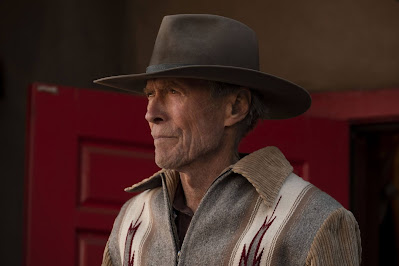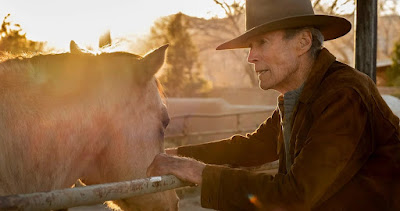New blood or not, a year later Howard calls on Mike to find his teenage son, Rafo (Eduardo Minett), in Mexico, under the ostensible care of his mother Leta (Fernanda Urrejola), and bring him home. If Mike’s heeding the call is partly because he owes Howard for rescuing him from a fruitless existence of addiction after the death of his family, it is also because Howard cynically exploits Mike’s need to live up to some masculine sense of being a hero. It’s that idea Eastwood wants to wrangle with one more time, all these years after “Unforgiven”, not so long after “American Sniper”, of heroism and masculinity and the toll they take. True, in Mike’s quickly tracking down Leta, the character of Nick Schenk and N. Richard Nash’s screenplay not only lives up to the unflattering nutcase stereotype rather than subverting it any interesting way, she almost instantly tries to seduce Mike, despite his looking like a rickety grandfather in standing next to her. This speaks not only to how the role was likely written for someone younger, but how, even at his age and willing to show it and play it, Eastwood can’t help but an indulge a movie star maxim, an inadvertent if cutting commentary too. But while the emergent movie, in which Mike becomes unlikely mentor to Rafo in shepherding him back to America, never proves as biting nor witty as “Unforgiven’s” dissecting of machismo, in eschewing the savior complex that ultimately undid the similar mentor/ protégé relationship of “Gran Torino”, “Cry Macho” succeeds on its much more measured terms.
Though the plot suggests urgency, Mike and Rafo evading the police as they head for the border, “Cry Macho” kind of casually waves away most of the expected plot theatrics, epitomized in a scene where their stolen car is searched for drugs, seeming to set up the obvious, only to have an ornery Mike remark “we don’t have any drugs”, like Eastwood himself is telling you, the viewer, no, I’m doing that, that’s stupid. No, this is not really an action picture, even if Mike throws a punch, but a gentle drama of acceptance. It truly comes to life mid-movie when Mike and Rafo are forced to hide out in a small Mexican town, the widowed Mike finding a quiet kind of romance with the widowed Marta (Natalia Traven). In truth, she is not much of a character, mostly getting by on Traven’s own grace notes, but Eastwood, typically a nuts and bolts kind of director, also succeeds in these sequences by tapping into his inner-lyricist. Despite myriad echoes to his Eastwood’s own movies, in these passages, tending animals and riding horses, he achieves something closer to the prologue of “The Thin Red Line”, Mike finding a pastoral Eden, the scenes in which he and Marta dance becoming a lovely metaphor for falling into a place’s rhythms.
More than a relationship between Mike and Rafo, frankly, this is what “Cry Macho” is, an older man finding inner peace, the striking purple sunsets standing in as a visual demarcation of Mike’s twilight.
the guidance he passes on to his young charge sounding like . “I don’t know how to cure old,” he says of a sickly dog the small town’s sheriff brings to Mike in the hopes of finding a cure, though he might as well be talking about himself and Eastwood about Eastwood, the lines blurring between fiction and real-life the further “Cry Macho” goes, a companion piece, of sorts, to the autobiographical juju of “The Misfits.” In that 1961 John Huston movie it was virtually impossible not to see Marilyn Monroe, Clark Gable, and Montgomery Clift as versions of themselves just as it’s hard not to see Mike Milo as Clint Eastwood. The guidance Mike passes on to Rafo about the perils of acting macho come across as much Eastwood setting things straight for the record even as the open ending, Mike seeing through his obligation but dangling the possibility that Rafo’s father does not have the best intentions, suggests that even here, now, at age 91, Eastwood does not have all the answers.





No comments:
Post a Comment